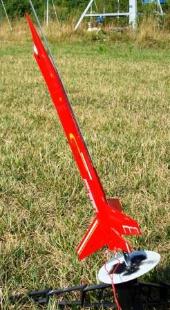
Brief:
“Galactic deterrent of ever-threatening invasions, this strike fighter is equipped with laser weaponry, time warp drive and de-ionizing technology. Invisible on all known scanners, Argosy can strike and evade retaliation easily.” Produced by Estes from 1987 to 1990, the Argosy is a skill level three kit, with multi-piece asymmetric fins, a very distinctive jet fighter look, and a unique cockpit style nose cone. The argosy flies on the standard assortment of 18mm black powder motors and use parachute recovery. I never built one as a kid, so when I had a chance to pick one up in an online auction I took it. I have subsequently found this kit available through a couple of different online hobby stores, although never more than one or two.
Construction:
The Argosy comes packaged in a standard “hang-tag” plastic bag with the artwork, inserts and instructions common to Estes products of the 80s and 90s. The components were good quality, and in very good shape for a kit that is at least 20 years old.
The following items are included it the kit:
- BT-50 Body Tube 12.75”
- BT-20 Motor Tube 2.75”
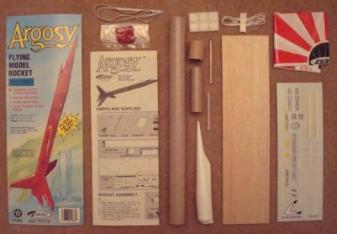
- Motor Hook
- Long Motor Mount
- Centering Ring CR20/50
- 3/32” Die Cut Balsa Fin Sheet
- Nose Cone PNC-50SP
- 1/8” x 2.25” Launch Lug
- Rubber Shock Cord 18”
- 12” Unassembled Parachute
- Shroud Lines
- Tape Disks for Shroud Line Attachment
- Platicine “Clay” Nose Cone Weight 0.3oz
- Instruction Sheet
- Decal Sheet
The unique look of the Argosy comes from the fin configuration, which is also what makes this a skill level 3 kit. Along with the different fin shapes and multi piece fin construction, the Argosy also sports 2 fins which are not attached perpendicular to the body tube. In other words, the base of the fin is not left square, and the fins are glued on at an angle to the surface of the body tube. When I first looked at this kit I could not imagine how this could be accomplished with consistent results. Even after reading the directions several times, the light did not go on for me until I actually went to attach these two fins, and finally had my “Ahhhhhaaaa” moment. The rest of the Argosy is fairly standard construction with respect to model rockets. The instructions are printed over two pages, front and back, and are simple, effective and well illustrated.
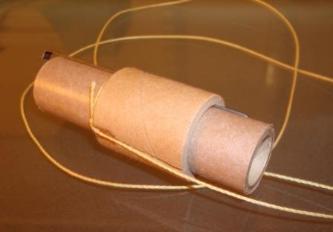 Motor mount assemble is fairly standard. A slit is cut in the motor tube for the engine hook, and then the single long centering ring is glued in place, securing the hook. As was standard for a while with Estes kits, a thrust ring was not included, so I added one from my parts bin. I also added a 30” length of Kevlar string to the recovery system. This was accomplished by tying the cord around the motor mount tube aft of the centering ring, and the cutting a shallow groove in the ring to allow the cord to pass. I tucked the Kevlar cord back through the motor tube to keep it out of the way and waited until the rocket was finished to fish it back out. After applying glue fillets to the motor mount centering ring, I swabbed a ring of glue inside the body tube and slid the motor mount into place with the end of the motor tube even with the end of the body tube.
Motor mount assemble is fairly standard. A slit is cut in the motor tube for the engine hook, and then the single long centering ring is glued in place, securing the hook. As was standard for a while with Estes kits, a thrust ring was not included, so I added one from my parts bin. I also added a 30” length of Kevlar string to the recovery system. This was accomplished by tying the cord around the motor mount tube aft of the centering ring, and the cutting a shallow groove in the ring to allow the cord to pass. I tucked the Kevlar cord back through the motor tube to keep it out of the way and waited until the rocket was finished to fish it back out. After applying glue fillets to the motor mount centering ring, I swabbed a ring of glue inside the body tube and slid the motor mount into place with the end of the motor tube even with the end of the body tube.
Next the fins were separated from their balsa sheet and cleaned up with 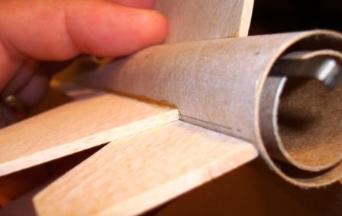 sandpaper. The main “wings” are composed of 2 separate pieces, and the instructions direct you to glue the main wings onto the body tube and then add the forward fin strips later. I decided instead to tack the pieces together first on a flat surface using thin CA glue. A wrap around fin marking guide is included in the instructions. After marking the body tube, I use a section of small aluminum angle to extend the lines as required. There are 5 total fins on the Argosy, and 3 different fin shapes so you need to pay attention to which fin goes where and in what direction. The main wings are placed 1.125” and the “tail fin” 0.5” from the aft end of the body tube. The two rear fins are placed even with the aft end of the body tube and these are the fins that do not project straight out from the rocket, but rather at the same angle as the main fins, which they sit next to. The instructions direct you to sand the root edge of these fins at an angle and to test fit them as you do this to get the best fit. It was during this process that I discovered how simple this step actually is. The front corner of the rear fin overlaps the trailing edge of the main wing, which in turn acts as an alignment platform. Once I comprehended what was going on I went back and looked at the directions again. This step is clearly
sandpaper. The main “wings” are composed of 2 separate pieces, and the instructions direct you to glue the main wings onto the body tube and then add the forward fin strips later. I decided instead to tack the pieces together first on a flat surface using thin CA glue. A wrap around fin marking guide is included in the instructions. After marking the body tube, I use a section of small aluminum angle to extend the lines as required. There are 5 total fins on the Argosy, and 3 different fin shapes so you need to pay attention to which fin goes where and in what direction. The main wings are placed 1.125” and the “tail fin” 0.5” from the aft end of the body tube. The two rear fins are placed even with the aft end of the body tube and these are the fins that do not project straight out from the rocket, but rather at the same angle as the main fins, which they sit next to. The instructions direct you to sand the root edge of these fins at an angle and to test fit them as you do this to get the best fit. It was during this process that I discovered how simple this step actually is. The front corner of the rear fin overlaps the trailing edge of the main wing, which in turn acts as an alignment platform. Once I comprehended what was going on I went back and looked at the directions again. This step is clearly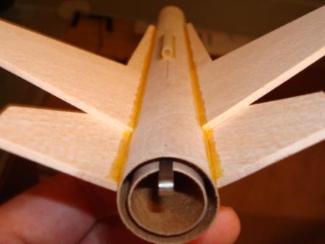 explained, but somehow I just didn’t “see” it until I could actually see it. I followed my normal routine for attaching fins by using a double glue joint, and then add a second fillet of wood glue.
explained, but somehow I just didn’t “see” it until I could actually see it. I followed my normal routine for attaching fins by using a double glue joint, and then add a second fillet of wood glue.
The launch lug is attached on the bottom side of the rocket between the main fins, 4” from the aft end of the body tube. The last thing to take care of was to fish the Kevlar® shock cord out of the body tube, tie the elastic shock cord to the Kevlar® and then to the nose cone and put a drop of thin CA glue on all the knots. I did replace the stock “rubber band” shock cord with a slightly longer piece of flat elastic.
Finishing:
Finishing the Argosy is fairly simple. My standard finishing routine starts with using Elmer’s Wood Filler to apply nice smooth fillets along the fin and launch lug joints. This is a little challenging where the main wings and stabilizers overlap, but not impossible. Next I used 2 coats of thinned down Elmer’s Wood Filler to fill the grain on all the fins, followed by two coats of primer, sanding between coats. The entire rocket was painted gloss red. The final step in finishing the Argosy involves applying all the decals, which are fairly detailed and add just the right finishing touch for this bird. When I first opened up this kit I was amazed at how well the decal sheet appeared to have held up over the years. I did not take any special precautions with the decals (a mistake). Initially when I applied them, the decals appeared to work perfectly. All the decals separated from the backing paper with no problems, were easy to position, and laid down well on the rocket. I was pretty excited about this until I came back the next day and discovered that the decals had not adhered uniformly to the surface of the rocket, and there were dry spots visible under most of them. Rather than stop to think abou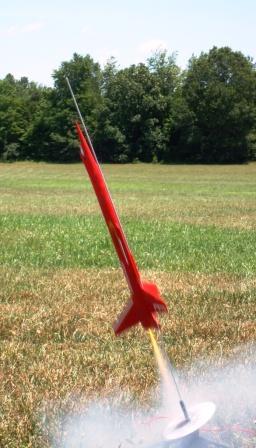 t the situation, I clear coated everything and called it done. Obviously there are products available that could have corrected my problems, decal setting solution, in particular, but I didn’t bother. Overall this is a sharp looking bird that will always attract a second look or two from folks on the range.
t the situation, I clear coated everything and called it done. Obviously there are products available that could have corrected my problems, decal setting solution, in particular, but I didn’t bother. Overall this is a sharp looking bird that will always attract a second look or two from folks on the range.
Construction Rating: 4 out of 5
Flight:
The Argosy flies on the standard assortment of 18mm black powder motors. The instructions include steps for packing the provided clay into the tip of the nose cone, so obviously there were concerns about the stability margin of this design. I built up a design file using Rocksim and was surprised to find that it should be stable with no added weight in the nose cone. Once the rocket was finished I weighed and balanced it to make sure I was in line with the calculated values. My finished weight without a motor was 1.6 oz and the CG was only about 0.25” aft of the Rocksim prediction, resulting in plenty of margin. So far the Argosy has flown a total of four flights, on “A” “B” and “C” motors with no observed stability issues. The only off nominal characteristic that I’ve seen is that once in a while the Argosy will waggle its tail a bit after burnout, which I can only attribute to the large area of the main wings and the 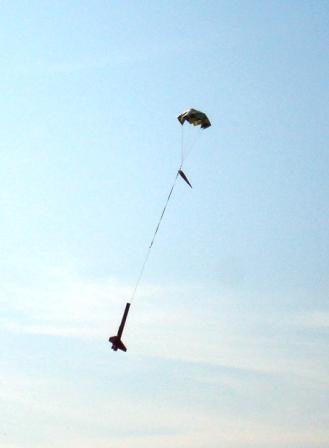 corresponding asymmetry of the fin layout.
corresponding asymmetry of the fin layout.
Recovery:
The Argosy comes with an unassembled 12” parachute. I modified the shroud line attach points slightly by using reinforcement rings on both sides of the chute corners, and then tying the shroud lines through the chute material. I also added a small fishing swivel to the shroud lines to help reduce tangling and allow for easy removal of the chute for storage. 3 sheets of standard recovery wadding are sufficient to protect the cute. The 12” chute brings the Argosy back for a nice easy touchdown, and I’ve had no issues through four flights so far.
Flight Rating: 4 out of 5
Summary:
PROS: Very unique futuristic “Jet Fighter” looks, with multiple asymmetric fins and one of a kind nose cone.
CONS: None, except for the fact that you can’t buy it anymore and it is difficult to clone due to the unique nose cone.
Overall Rating: 4 out of 5
Other:
The basic conical nose cone shape is available in the current Estes SkyWriter kit, and also in balsa form through Semroc. Patterns for a cockpit which can be added to the nose cone are available online, as are decals, so cloning this bird is not outside the realm of the possible.



 Motor mount assemble is fairly standard. A slit is cut in the motor tube for the engine hook, and then the single long centering ring is glued in place, securing the hook. As was standard for a while with Estes kits, a thrust ring was not included, so I added one from my parts bin. I also added a 30” length of Kevlar string to the recovery system. This was accomplished by tying the cord around the motor mount tube aft of the centering ring, and the cutting a shallow groove in the ring to allow the cord to pass. I tucked the Kevlar cord back through the motor tube to keep it out of the way and waited until the rocket was finished to fish it back out. After applying glue fillets to the motor mount centering ring, I swabbed a ring of glue inside the body tube and slid the motor mount into place with the end of the motor tube even with the end of the body tube.
Motor mount assemble is fairly standard. A slit is cut in the motor tube for the engine hook, and then the single long centering ring is glued in place, securing the hook. As was standard for a while with Estes kits, a thrust ring was not included, so I added one from my parts bin. I also added a 30” length of Kevlar string to the recovery system. This was accomplished by tying the cord around the motor mount tube aft of the centering ring, and the cutting a shallow groove in the ring to allow the cord to pass. I tucked the Kevlar cord back through the motor tube to keep it out of the way and waited until the rocket was finished to fish it back out. After applying glue fillets to the motor mount centering ring, I swabbed a ring of glue inside the body tube and slid the motor mount into place with the end of the motor tube even with the end of the body tube. sandpaper. The main “wings” are composed of 2 separate pieces, and the instructions direct you to glue the main wings onto the body tube and then add the forward fin strips later. I decided instead to tack the pieces together first on a flat surface using thin CA glue. A wrap around fin marking guide is included in the instructions. After marking the body tube, I use a section of small aluminum angle to extend the lines as required. There are 5 total fins on the Argosy, and 3 different fin shapes so you need to pay attention to which fin goes where and in what direction. The main wings are placed 1.125” and the “tail fin” 0.5” from the aft end of the body tube. The two rear fins are placed even with the aft end of the body tube and these are the fins that do not project straight out from the rocket, but rather at the same angle as the main fins, which they sit next to. The instructions direct you to sand the root edge of these fins at an angle and to test fit them as you do this to get the best fit. It was during this process that I discovered how simple this step actually is. The front corner of the rear fin overlaps the trailing edge of the main wing, which in turn acts as an alignment platform. Once I comprehended what was going on I went back and looked at the directions again. This step is clearly
sandpaper. The main “wings” are composed of 2 separate pieces, and the instructions direct you to glue the main wings onto the body tube and then add the forward fin strips later. I decided instead to tack the pieces together first on a flat surface using thin CA glue. A wrap around fin marking guide is included in the instructions. After marking the body tube, I use a section of small aluminum angle to extend the lines as required. There are 5 total fins on the Argosy, and 3 different fin shapes so you need to pay attention to which fin goes where and in what direction. The main wings are placed 1.125” and the “tail fin” 0.5” from the aft end of the body tube. The two rear fins are placed even with the aft end of the body tube and these are the fins that do not project straight out from the rocket, but rather at the same angle as the main fins, which they sit next to. The instructions direct you to sand the root edge of these fins at an angle and to test fit them as you do this to get the best fit. It was during this process that I discovered how simple this step actually is. The front corner of the rear fin overlaps the trailing edge of the main wing, which in turn acts as an alignment platform. Once I comprehended what was going on I went back and looked at the directions again. This step is clearly explained, but somehow I just didn’t “see” it until I could actually see it. I followed my normal routine for attaching fins by using a double glue joint, and then add a second fillet of wood glue.
explained, but somehow I just didn’t “see” it until I could actually see it. I followed my normal routine for attaching fins by using a double glue joint, and then add a second fillet of wood glue. t the situation, I clear coated everything and called it done. Obviously there are products available that could have corrected my problems, decal setting solution, in particular, but I didn’t bother. Overall this is a sharp looking bird that will always attract a second look or two from folks on the range.
t the situation, I clear coated everything and called it done. Obviously there are products available that could have corrected my problems, decal setting solution, in particular, but I didn’t bother. Overall this is a sharp looking bird that will always attract a second look or two from folks on the range. corresponding asymmetry of the fin layout.
corresponding asymmetry of the fin layout.














